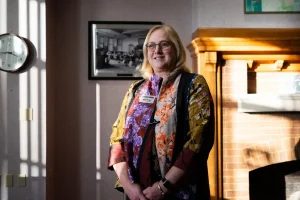Student Association discusses students for sustainability senate seat, SEI’s, and a pass/fail grading system at UWL
April 2, 2020
Student Association (SA) at the University of Wisconsin-La Crosse met virtually on April 1 to discuss a resolution appointing the group students for sustainability (SFS) to the vacant senate seat and the possibility of a pass/fail system put into place amid UWL’s transition to online classes due to the COVID-19 pandemic.
President Sita Agterberg said in her officer report that SEI’s will be suspended for the semester, and instead, there will be a section in Canvas where students are encouraged to leave feedback concerning their classes. “This semester would really throw off data, so there’s no real reason to hold SEI’s since this isn’t how classes are supposed to be ran anyways,” said Agterberg. Additionally, Agterberg reported that students with registration holds on their accounts will not be restricted for fall registration as usual, as long as they have over $100 in their accounts.
According to senate bylaws, each year SA is able to allow a new student organization to apply for a seat on the senate. SA discussed the possibility of adding SFS as a permanent seat. The student environment wellness group has is an environment for students to voice their opinions and participate in activities surrounding sustainability efforts. With new members on the rise, sustainability director Samantha Wolfe advocated for this resolution by validating the SFS senator position held by Andrew Ericson, saying “the current Students for Sustainability senator, Andrew Ericson, has fulfilled the vacant seat outlined in the Student Senate bylaws by participating in meetings, committees, organization reports, and providing opinions based on sustainability.”
UWL students were sent an email this week from the faculty senate by SA regarding potentially switching to a pass/fail grading system for this semester. The email informed students that a pass/fail system would likely not be needed, as the current system put into place “benefits both students and educational quality.” Sen. Alaina Goodreau spoke about these issues with her constituents, who were at first all supportive of a pass/fail system.
“When I mentioned what it would actually turn out to be, pass being a 2.0 average, everyone changed their minds,” said Goodreau, stating her concerns as well with the students who recently produced a petition supporting a pass/fail system. “I think if more students knew about the effects this could have on GPAs, it may change their minds.”
Agterberg discussed the possibility of this system being implemented within UWL by comparing it to other UW-system schools’ policies. UW-Madison and UW-Milwaukee are in the midst of a new pass/fail system, in which UW-Madison offers students the opportunity to decide eight days prior to the end of the semester which classes they would like to convert from a 4.0 system over into pass/fail. They would be able to keep their normal letter grade for a class they might need, and a pass/fail for a class that may not pertain to their end goals.
“These are bigger institutions, so they may have more resources available,” Agterberg said. “So it may be extremely difficult to figure out how to adjust to this here at UWL.”
Sen. Packard’s concerns surround what it may mean for his continuants, who are graduate students and who are put on academic probation if they drop below a 3.0 GPA. Packard also mentioned how grant money may not be extended for graduate student’s research, an award they need in order to complete their master’s research. If these grants are not extended due to complications regarding lab access, since UWL shut down their facilities, this would prove to be very difficult for these students.
“If we can’t use or, let alone order, any of our equipment for our research, not only will it possibly delay when you may graduate but it may delay, or even completely withhold, the completion of your research,” said Packard. He said he planned to research more information regarding whether the effects of these grants will come out of student’s pockets.
Packard also wanted to address his issues with his wifi connection, describing how he is barely getting by with his course material through the use of his mobile data hot-spot. “A lot of people, and there are multiple people, who are home right now who are staying with family that are working from home. There may just not be enough bandwidth; here at home I can’t be on the internet all day, I’m totally dependent on my phone,” said Packard.






